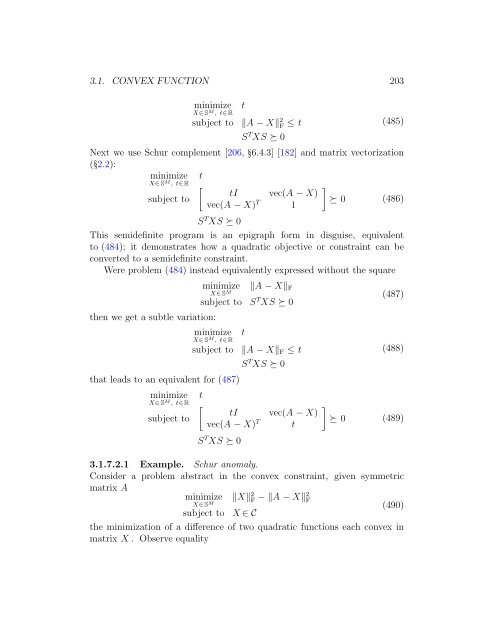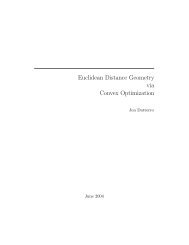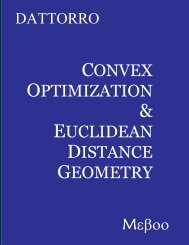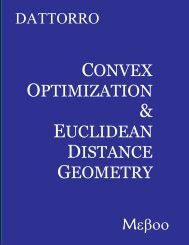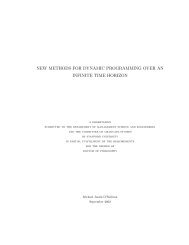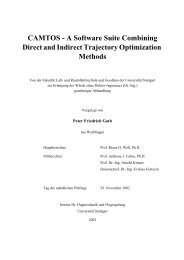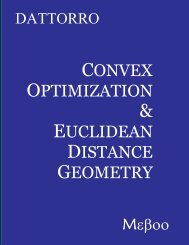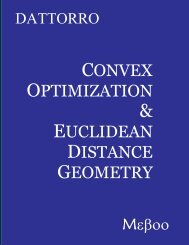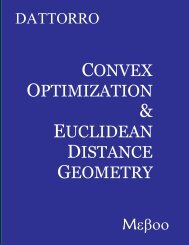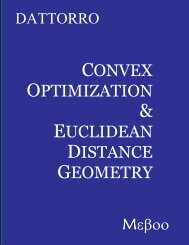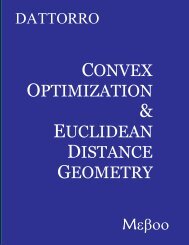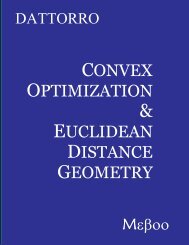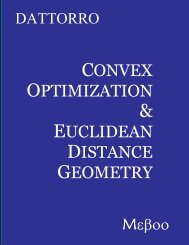- Page 1 and 2:
DATTORROCONVEXOPTIMIZATION&EUCLIDEA
- Page 3 and 4:
Convex Optimization&Euclidean Dista
- Page 5 and 6:
for Jennie Columba♦Antonio♦♦&
- Page 7 and 8:
PreludeThe constant demands of my d
- Page 9 and 10:
Convex Optimization&Euclidean Dista
- Page 11 and 12:
CONVEX OPTIMIZATION & EUCLIDEAN DIS
- Page 13 and 14:
List of Figures1 Overview 191 Orion
- Page 15 and 16:
LIST OF FIGURES 1559 Epigraph . . .
- Page 17 and 18:
LIST OF FIGURES 17120 Four fundamen
- Page 19 and 20:
Chapter 1OverviewConvex Optimizatio
- Page 21 and 22:
ˇx 4ˇx 3ˇx 2Figure 2: Applicatio
- Page 23 and 24:
23Figure 4: This coarsely discretiz
- Page 25 and 26:
ases (biorthogonal expansion). We e
- Page 27 and 28:
27Figure 7: These bees construct a
- Page 29 and 30:
its membership to the EDM cone. The
- Page 31 and 32:
31appendicesProvided so as to be mo
- Page 33 and 34:
Chapter 2Convex geometryConvexity h
- Page 35 and 36:
2.1. CONVEX SET 35Figure 11: A slab
- Page 37 and 38:
2.1. CONVEX SET 372.1.6 empty set v
- Page 39 and 40:
2.1. CONVEX SET 392.1.7.1 Line inte
- Page 41 and 42:
2.1. CONVEX SET 41(a)R 2(b)R 3(c)(d
- Page 43 and 44:
2.1. CONVEX SET 43This theorem in c
- Page 45 and 46:
2.2. VECTORIZED-MATRIX INNER PRODUC
- Page 47 and 48:
2.2. VECTORIZED-MATRIX INNER PRODUC
- Page 49 and 50:
2.2. VECTORIZED-MATRIX INNER PRODUC
- Page 51 and 52:
2.2. VECTORIZED-MATRIX INNER PRODUC
- Page 53 and 54:
2.3. HULLS 53Figure 14: Convex hull
- Page 55 and 56:
2.3. HULLS 55Aaffine hull (drawn tr
- Page 57 and 58:
2.3. HULLS 57The union of relative
- Page 59 and 60:
2.4. HALFSPACE, HYPERPLANE 59of dim
- Page 61 and 62:
2.4. HALFSPACE, HYPERPLANE 61H +ay
- Page 63 and 64:
2.4. HALFSPACE, HYPERPLANE 63Inters
- Page 65 and 66:
2.4. HALFSPACE, HYPERPLANE 65Conver
- Page 67 and 68:
2.4. HALFSPACE, HYPERPLANE 67A 1A 2
- Page 69 and 70:
2.4. HALFSPACE, HYPERPLANE 69tradit
- Page 71 and 72:
2.4. HALFSPACE, HYPERPLANE 71There
- Page 73 and 74:
2.5. SUBSPACE REPRESENTATIONS 73nor
- Page 75 and 76:
2.5. SUBSPACE REPRESENTATIONS 752.5
- Page 77 and 78:
2.6. EXTREME, EXPOSED 77In other wo
- Page 79 and 80:
2.6. EXTREME, EXPOSED 792.6.1 Expos
- Page 81 and 82:
2.7. CONES 812.6.1.3.1 Definition.
- Page 83 and 84:
2.7. CONES 830Figure 26: Boundary o
- Page 85 and 86:
2.7. CONES 852.7.2 Convex coneWe ca
- Page 87 and 88:
2.7. CONES 87Thus the simplest and
- Page 89 and 90:
2.7. CONES 89nomenclature generaliz
- Page 91 and 92:
2.8. CONE BOUNDARY 91Proper cone {0
- Page 93 and 94:
2.8. CONE BOUNDARY 93the same extre
- Page 95 and 96:
2.8. CONE BOUNDARY 95For a proper c
- Page 97 and 98:
2.9. POSITIVE SEMIDEFINITE (PSD) CO
- Page 99 and 100:
2.9. POSITIVE SEMIDEFINITE (PSD) CO
- Page 101 and 102:
2.9. POSITIVE SEMIDEFINITE (PSD) CO
- Page 103 and 104:
2.9. POSITIVE SEMIDEFINITE (PSD) CO
- Page 105 and 106:
2.9. POSITIVE SEMIDEFINITE (PSD) CO
- Page 107 and 108:
2.9. POSITIVE SEMIDEFINITE (PSD) CO
- Page 109 and 110:
2.9. POSITIVE SEMIDEFINITE (PSD) CO
- Page 111 and 112:
2.9. POSITIVE SEMIDEFINITE (PSD) CO
- Page 113 and 114:
2.9. POSITIVE SEMIDEFINITE (PSD) CO
- Page 115 and 116:
2.9. POSITIVE SEMIDEFINITE (PSD) CO
- Page 117 and 118:
2.9. POSITIVE SEMIDEFINITE (PSD) CO
- Page 119 and 120:
2.9. POSITIVE SEMIDEFINITE (PSD) CO
- Page 121 and 122:
2.10. CONIC INDEPENDENCE (C.I.) 121
- Page 123 and 124:
2.10. CONIC INDEPENDENCE (C.I.) 123
- Page 125 and 126:
2.10. CONIC INDEPENDENCE (C.I.) 125
- Page 127 and 128:
2.12. CONVEX POLYHEDRA 127It follow
- Page 129 and 130:
2.12. CONVEX POLYHEDRA 129Coefficie
- Page 131 and 132:
2.12. CONVEX POLYHEDRA 1312.12.3 Un
- Page 133 and 134:
2.12. CONVEX POLYHEDRA 133
- Page 135 and 136:
2.13. DUAL CONE & GENERALIZED INEQU
- Page 137 and 138:
2.13. DUAL CONE & GENERALIZED INEQU
- Page 139 and 140:
2.13. DUAL CONE & GENERALIZED INEQU
- Page 141 and 142:
2.13. DUAL CONE & GENERALIZED INEQU
- Page 143 and 144:
2.13. DUAL CONE & GENERALIZED INEQU
- Page 145 and 146:
2.13. DUAL CONE & GENERALIZED INEQU
- Page 147 and 148:
2.13. DUAL CONE & GENERALIZED INEQU
- Page 149 and 150:
2.13. DUAL CONE & GENERALIZED INEQU
- Page 151 and 152: 2.13. DUAL CONE & GENERALIZED INEQU
- Page 153 and 154: 2.13. DUAL CONE & GENERALIZED INEQU
- Page 155 and 156: 2.13. DUAL CONE & GENERALIZED INEQU
- Page 157 and 158: 2.13. DUAL CONE & GENERALIZED INEQU
- Page 159 and 160: 2.13. DUAL CONE & GENERALIZED INEQU
- Page 161 and 162: 2.13. DUAL CONE & GENERALIZED INEQU
- Page 163 and 164: 2.13. DUAL CONE & GENERALIZED INEQU
- Page 165 and 166: 2.13. DUAL CONE & GENERALIZED INEQU
- Page 167 and 168: 2.13. DUAL CONE & GENERALIZED INEQU
- Page 169 and 170: 2.13. DUAL CONE & GENERALIZED INEQU
- Page 171 and 172: 2.13. DUAL CONE & GENERALIZED INEQU
- Page 173 and 174: 2.13. DUAL CONE & GENERALIZED INEQU
- Page 175 and 176: 2.13. DUAL CONE & GENERALIZED INEQU
- Page 177 and 178: 2.13. DUAL CONE & GENERALIZED INEQU
- Page 179 and 180: 2.13. DUAL CONE & GENERALIZED INEQU
- Page 181 and 182: 2.13. DUAL CONE & GENERALIZED INEQU
- Page 183 and 184: Chapter 3Geometry of convex functio
- Page 185 and 186: 3.1. CONVEX FUNCTION 185f 1 (x)f 2
- Page 187 and 188: 3.1. CONVEX FUNCTION 1873.1.3 norm
- Page 189 and 190: 3.1. CONVEX FUNCTION 189n∑π(x) i
- Page 191 and 192: 3.1. CONVEX FUNCTION 191This means
- Page 193 and 194: 3.1. CONVEX FUNCTION 1933.1.5.3 pos
- Page 195 and 196: 3.1. CONVEX FUNCTION 1953.1.6.0.1 E
- Page 197 and 198: 3.1. CONVEX FUNCTION 1973.1.7 epigr
- Page 199 and 200: 3.1. CONVEX FUNCTION 1993.1.7.0.3 E
- Page 201: 3.1. CONVEX FUNCTION 201Although th
- Page 205 and 206: 3.1. CONVEX FUNCTION 2053.1.8 gradi
- Page 207 and 208: 3.1. CONVEX FUNCTION 2073.1.8.0.2 E
- Page 209 and 210: 3.1. CONVEX FUNCTION 209f(Y )[ ∇f
- Page 211 and 212: 3.1. CONVEX FUNCTION 211g is convex
- Page 213 and 214: 3.1. CONVEX FUNCTION 213αβα ≥
- Page 215 and 216: 3.1. CONVEX FUNCTION 2153.1.11 seco
- Page 217 and 218: 3.2. MATRIX-VALUED CONVEX FUNCTION
- Page 219 and 220: 3.2. MATRIX-VALUED CONVEX FUNCTION
- Page 221 and 222: 3.3. QUASICONVEX 221matrices in the
- Page 223 and 224: 3.3. QUASICONVEX 223on R M + . Alth
- Page 225 and 226: Chapter 4Semidefinite programmingPr
- Page 227 and 228: 4.1. CONIC PROBLEM 227where K is a
- Page 229 and 230: 4.1. CONIC PROBLEM 229C0PΓ 1Γ 2S+
- Page 231 and 232: 4.1. CONIC PROBLEM 231faces of S 3
- Page 233 and 234: 4.1. CONIC PROBLEM 2334.1.1.3 Previ
- Page 235 and 236: 4.2. FRAMEWORK 235Equivalently, pri
- Page 237 and 238: 4.2. FRAMEWORK 237is positive semid
- Page 239 and 240: 4.2. FRAMEWORK 239Optimal value of
- Page 241 and 242: 4.2. FRAMEWORK 2414.2.3.1.1 Example
- Page 243 and 244: 4.2. FRAMEWORK 243where δ is the m
- Page 245 and 246: 4.2. FRAMEWORK 2454.2.3.1.2 Example
- Page 247 and 248: 4.3. RANK REDUCTION 2474.3 Rank red
- Page 249 and 250: 4.3. RANK REDUCTION 249A rank-reduc
- Page 251 and 252: 4.3. RANK REDUCTION 251(t ⋆ i)
- Page 253 and 254:
4.3. RANK REDUCTION 2534.3.3.0.1 Ex
- Page 255 and 256:
4.3. RANK REDUCTION 2554.3.3.0.2 Ex
- Page 257 and 258:
4.4. RANK-CONSTRAINED SEMIDEFINITE
- Page 259 and 260:
4.4. RANK-CONSTRAINED SEMIDEFINITE
- Page 261 and 262:
4.4. RANK-CONSTRAINED SEMIDEFINITE
- Page 263 and 264:
4.4. RANK-CONSTRAINED SEMIDEFINITE
- Page 265 and 266:
4.4. RANK-CONSTRAINED SEMIDEFINITE
- Page 267 and 268:
4.4. RANK-CONSTRAINED SEMIDEFINITE
- Page 269 and 270:
4.4. RANK-CONSTRAINED SEMIDEFINITE
- Page 271 and 272:
4.4. RANK-CONSTRAINED SEMIDEFINITE
- Page 273 and 274:
4.5. CONSTRAINING CARDINALITY 2734.
- Page 275 and 276:
4.5. CONSTRAINING CARDINALITY 275Th
- Page 277 and 278:
4.5. CONSTRAINING CARDINALITY 277wh
- Page 279 and 280:
4.5. CONSTRAINING CARDINALITY 279f
- Page 281 and 282:
4.5. CONSTRAINING CARDINALITY 281al
- Page 283 and 284:
4.6. CARDINALITY AND RANK CONSTRAIN
- Page 285 and 286:
4.6. CARDINALITY AND RANK CONSTRAIN
- Page 287 and 288:
4.6. CARDINALITY AND RANK CONSTRAIN
- Page 289 and 290:
4.6. CARDINALITY AND RANK CONSTRAIN
- Page 291 and 292:
4.6. CARDINALITY AND RANK CONSTRAIN
- Page 293 and 294:
4.6. CARDINALITY AND RANK CONSTRAIN
- Page 295 and 296:
4.6. CARDINALITY AND RANK CONSTRAIN
- Page 297 and 298:
4.6. CARDINALITY AND RANK CONSTRAIN
- Page 299 and 300:
4.6. CARDINALITY AND RANK CONSTRAIN
- Page 301 and 302:
4.7. CONVEX ITERATION RANK-1 301whi
- Page 303 and 304:
4.7. CONVEX ITERATION RANK-1 303the
- Page 305 and 306:
Chapter 5Euclidean Distance MatrixT
- Page 307 and 308:
5.2. FIRST METRIC PROPERTIES 307cor
- Page 309 and 310:
5.3. ∃ FIFTH EUCLIDEAN METRIC PRO
- Page 311 and 312:
5.3. ∃ FIFTH EUCLIDEAN METRIC PRO
- Page 313 and 314:
5.4. EDM DEFINITION 313The collecti
- Page 315 and 316:
5.4. EDM DEFINITION 3155.4.2 Gram-f
- Page 317 and 318:
5.4. EDM DEFINITION 317D ∈ EDM N
- Page 319 and 320:
5.4. EDM DEFINITION 3195.4.2.2.1 Ex
- Page 321 and 322:
5.4. EDM DEFINITION 321ten affine e
- Page 323 and 324:
5.4. EDM DEFINITION 323spheres:Then
- Page 325 and 326:
5.4. EDM DEFINITION 325By eliminati
- Page 327 and 328:
5.4. EDM DEFINITION 327whereΦ ij =
- Page 329 and 330:
5.4. EDM DEFINITION 3295.4.2.2.5 De
- Page 331 and 332:
5.4. EDM DEFINITION 331105ˇx 4ˇx
- Page 333 and 334:
5.4. EDM DEFINITION 333corrected by
- Page 335 and 336:
5.4. EDM DEFINITION 335by translate
- Page 337 and 338:
5.4. EDM DEFINITION 337Crippen & Ha
- Page 339 and 340:
5.4. EDM DEFINITION 339where ([√t
- Page 341 and 342:
5.4. EDM DEFINITION 341because (A.3
- Page 343 and 344:
5.5. INVARIANCE 3435.5.1.0.1 Exampl
- Page 345 and 346:
5.6. INJECTIVITY OF D & UNIQUE RECO
- Page 347 and 348:
5.6. INJECTIVITY OF D & UNIQUE RECO
- Page 349 and 350:
5.6. INJECTIVITY OF D & UNIQUE RECO
- Page 351 and 352:
5.7. EMBEDDING IN AFFINE HULL 3515.
- Page 353 and 354:
5.7. EMBEDDING IN AFFINE HULL 353Fo
- Page 355 and 356:
5.7. EMBEDDING IN AFFINE HULL 3555.
- Page 357 and 358:
5.8. EUCLIDEAN METRIC VERSUS MATRIX
- Page 359 and 360:
5.8. EUCLIDEAN METRIC VERSUS MATRIX
- Page 361 and 362:
5.8. EUCLIDEAN METRIC VERSUS MATRIX
- Page 363 and 364:
5.8. EUCLIDEAN METRIC VERSUS MATRIX
- Page 365 and 366:
5.9. BRIDGE: CONVEX POLYHEDRA TO ED
- Page 367 and 368:
5.9. BRIDGE: CONVEX POLYHEDRA TO ED
- Page 369 and 370:
5.9. BRIDGE: CONVEX POLYHEDRA TO ED
- Page 371 and 372:
5.9. BRIDGE: CONVEX POLYHEDRA TO ED
- Page 373 and 374:
5.10. EDM-ENTRY COMPOSITION 373(ii)
- Page 375 and 376:
5.11. EDM INDEFINITENESS 3755.11.1
- Page 377 and 378:
5.11. EDM INDEFINITENESS 377(confer
- Page 379 and 380:
5.11. EDM INDEFINITENESS 379we have
- Page 381 and 382:
5.11. EDM INDEFINITENESS 381For pre
- Page 383 and 384:
5.12. LIST RECONSTRUCTION 383where
- Page 385 and 386:
5.12. LIST RECONSTRUCTION 385(a)(c)
- Page 387 and 388:
5.13. RECONSTRUCTION EXAMPLES 387D
- Page 389 and 390:
5.13. RECONSTRUCTION EXAMPLES 389Th
- Page 391 and 392:
5.13. RECONSTRUCTION EXAMPLES 391wh
- Page 393 and 394:
5.14. FIFTH PROPERTY OF EUCLIDEAN M
- Page 395 and 396:
5.14. FIFTH PROPERTY OF EUCLIDEAN M
- Page 397 and 398:
5.14. FIFTH PROPERTY OF EUCLIDEAN M
- Page 399 and 400:
5.14. FIFTH PROPERTY OF EUCLIDEAN M
- Page 401 and 402:
5.14. FIFTH PROPERTY OF EUCLIDEAN M
- Page 403 and 404:
Chapter 6Cone of distance matricesF
- Page 405 and 406:
6.1. DEFINING EDM CONE 4056.1 Defin
- Page 407 and 408:
6.2. POLYHEDRAL BOUNDS 407This cone
- Page 409 and 410:
6.3.√EDM CONE IS NOT CONVEX 409N
- Page 411 and 412:
6.4. A GEOMETRY OF COMPLETION 4116.
- Page 413 and 414:
6.4. A GEOMETRY OF COMPLETION 413(a
- Page 415 and 416:
6.4. A GEOMETRY OF COMPLETION 415Fi
- Page 417 and 418:
6.5. EDM DEFINITION IN 11 T 417and
- Page 419 and 420:
6.5. EDM DEFINITION IN 11 T 419then
- Page 421 and 422:
6.5. EDM DEFINITION IN 11 T 4216.5.
- Page 423 and 424:
6.5. EDM DEFINITION IN 11 T 423D =
- Page 425 and 426:
6.6. CORRESPONDENCE TO PSD CONE S N
- Page 427 and 428:
6.6. CORRESPONDENCE TO PSD CONE S N
- Page 429 and 430:
6.6. CORRESPONDENCE TO PSD CONE S N
- Page 431 and 432:
6.7. VECTORIZATION & PROJECTION INT
- Page 433 and 434:
6.7. VECTORIZATION & PROJECTION INT
- Page 435 and 436:
6.8. DUAL EDM CONE 435When the Fins
- Page 437 and 438:
6.8. DUAL EDM CONE 437Proof. First,
- Page 439 and 440:
6.8. DUAL EDM CONE 439EDM 2 = S 2 h
- Page 441 and 442:
6.8. DUAL EDM CONE 441whose veracit
- Page 443 and 444:
6.8. DUAL EDM CONE 4436.8.1.3.1 Exe
- Page 445 and 446:
6.8. DUAL EDM CONE 445has dual affi
- Page 447 and 448:
6.8. DUAL EDM CONE 4476.8.1.7 Schoe
- Page 449 and 450:
6.9. THEOREM OF THE ALTERNATIVE 449
- Page 451 and 452:
6.10. POSTSCRIPT 451When D is an ED
- Page 453 and 454:
Chapter 7Proximity problemsIn summa
- Page 455 and 456:
In contrast, order of projection on
- Page 457 and 458:
457HS N h0EDM NK = S N h ∩ R N×N
- Page 459 and 460:
4597.0.3 Problem approachProblems t
- Page 461 and 462:
7.1. FIRST PREVALENT PROBLEM: 461fi
- Page 463 and 464:
7.1. FIRST PREVALENT PROBLEM: 4637.
- Page 465 and 466:
7.1. FIRST PREVALENT PROBLEM: 465di
- Page 467 and 468:
7.1. FIRST PREVALENT PROBLEM: 4677.
- Page 469 and 470:
7.1. FIRST PREVALENT PROBLEM: 469wh
- Page 471 and 472:
7.1. FIRST PREVALENT PROBLEM: 471Th
- Page 473 and 474:
7.2. SECOND PREVALENT PROBLEM: 473O
- Page 475 and 476:
7.2. SECOND PREVALENT PROBLEM: 475S
- Page 477 and 478:
7.2. SECOND PREVALENT PROBLEM: 477r
- Page 479 and 480:
7.2. SECOND PREVALENT PROBLEM: 479c
- Page 481 and 482:
7.2. SECOND PREVALENT PROBLEM: 4817
- Page 483 and 484:
7.3. THIRD PREVALENT PROBLEM: 483fo
- Page 485 and 486:
7.3. THIRD PREVALENT PROBLEM: 485a
- Page 487 and 488:
7.3. THIRD PREVALENT PROBLEM: 4877.
- Page 489 and 490:
7.3. THIRD PREVALENT PROBLEM: 4897.
- Page 491 and 492:
7.3. THIRD PREVALENT PROBLEM: 491Ou
- Page 493 and 494:
7.4. CONCLUSION 493The rank constra
- Page 495 and 496:
Appendix ALinear algebraA.1 Main-di
- Page 497 and 498:
A.1. MAIN-DIAGONAL δ OPERATOR, λ
- Page 499 and 500:
A.2. SEMIDEFINITENESS: DOMAIN OF TE
- Page 501 and 502:
A.2. SEMIDEFINITENESS: DOMAIN OF TE
- Page 503 and 504:
A.3. PROPER STATEMENTS 503A.3.0.0.1
- Page 505 and 506:
A.3. PROPER STATEMENTS 505By simila
- Page 507 and 508:
A.3. PROPER STATEMENTS 507Because R
- Page 509 and 510:
For A,B ∈ R n×n x T Ax ≥ x T B
- Page 511 and 512:
A.3. PROPER STATEMENTS 511A.3.1.0.2
- Page 513 and 514:
A.3. PROPER STATEMENTS 513We can de
- Page 515 and 516:
A.4. SCHUR COMPLEMENT 515Origin of
- Page 517 and 518:
A.4. SCHUR COMPLEMENT 517Schur-form
- Page 519 and 520:
A.5. EIGEN DECOMPOSITION 519A.5.0.1
- Page 521 and 522:
A.6. SINGULAR VALUE DECOMPOSITION,
- Page 523 and 524:
A.6. SINGULAR VALUE DECOMPOSITION,
- Page 525 and 526:
A.6. SINGULAR VALUE DECOMPOSITION,
- Page 527 and 528:
A.7. ZEROS 527For diagonalizable ma
- Page 529 and 530:
A.7. ZEROS 529A.7.4For X,A∈ S M +
- Page 531 and 532:
A.7. ZEROS 531A.7.5.0.1 Proposition
- Page 533 and 534:
Appendix BSimple matricesMathematic
- Page 535 and 536:
B.1. RANK-ONE MATRIX (DYAD) 535R(v)
- Page 537 and 538:
B.1. RANK-ONE MATRIX (DYAD) 537rang
- Page 539 and 540:
B.2. DOUBLET 539R([u v ])R(Π)= R([
- Page 541 and 542:
B.3. ELEMENTARY MATRIX 541If λ ≠
- Page 543 and 544:
B.4. AUXILIARY V -MATRICES 543the n
- Page 545 and 546:
B.4. AUXILIARY V -MATRICES 54518. V
- Page 547 and 548:
B.5. ORTHOGONAL MATRIX 547B.5 Ortho
- Page 549 and 550:
B.5. ORTHOGONAL MATRIX 549B.5.3.0.1
- Page 551 and 552:
Appendix CSome analytical optimal r
- Page 553 and 554:
C.2. DIAGONAL, TRACE, SINGULAR AND
- Page 555 and 556:
C.2. DIAGONAL, TRACE, SINGULAR AND
- Page 557 and 558:
C.2. DIAGONAL, TRACE, SINGULAR AND
- Page 559 and 560:
C.3. ORTHOGONAL PROCRUSTES PROBLEM
- Page 561 and 562:
C.4. TWO-SIDED ORTHOGONAL PROCRUSTE
- Page 563 and 564:
C.4. TWO-SIDED ORTHOGONAL PROCRUSTE
- Page 565 and 566:
Appendix DMatrix calculusFrom too m
- Page 567 and 568:
D.1. DIRECTIONAL DERIVATIVE, TAYLOR
- Page 569 and 570:
D.1. DIRECTIONAL DERIVATIVE, TAYLOR
- Page 571 and 572:
D.1. DIRECTIONAL DERIVATIVE, TAYLOR
- Page 573 and 574:
D.1. DIRECTIONAL DERIVATIVE, TAYLOR
- Page 575 and 576:
D.1. DIRECTIONAL DERIVATIVE, TAYLOR
- Page 577 and 578:
D.1. DIRECTIONAL DERIVATIVE, TAYLOR
- Page 579 and 580:
D.1. DIRECTIONAL DERIVATIVE, TAYLOR
- Page 581 and 582:
D.1. DIRECTIONAL DERIVATIVE, TAYLOR
- Page 583 and 584:
D.1. DIRECTIONAL DERIVATIVE, TAYLOR
- Page 585 and 586:
D.1. DIRECTIONAL DERIVATIVE, TAYLOR
- Page 587 and 588:
D.2. TABLES OF GRADIENTS AND DERIVA
- Page 589 and 590:
D.2. TABLES OF GRADIENTS AND DERIVA
- Page 591 and 592:
D.2. TABLES OF GRADIENTS AND DERIVA
- Page 593 and 594:
D.2. TABLES OF GRADIENTS AND DERIVA
- Page 595 and 596:
Appendix EProjectionFor any A∈ R
- Page 597 and 598:
597Equivalent to the corresponding
- Page 599 and 600:
E.1. IDEMPOTENT MATRICES 599where R
- Page 601 and 602:
E.1. IDEMPOTENT MATRICES 601TxT ⊥
- Page 603 and 604:
E.2. I − P , PROJECTION ON ALGEBR
- Page 605 and 606:
E.3. SYMMETRIC IDEMPOTENT MATRICES
- Page 607 and 608:
E.3. SYMMETRIC IDEMPOTENT MATRICES
- Page 609 and 610:
E.3. SYMMETRIC IDEMPOTENT MATRICES
- Page 611 and 612:
E.5. PROJECTION EXAMPLES 611E.5.0.0
- Page 613 and 614:
E.5. PROJECTION EXAMPLES 613of rela
- Page 615 and 616:
E.5. PROJECTION EXAMPLES 615E.5.0.0
- Page 617 and 618:
E.6. VECTORIZATION INTERPRETATION,
- Page 619 and 620:
E.6. VECTORIZATION INTERPRETATION,
- Page 621 and 622:
E.6. VECTORIZATION INTERPRETATION,
- Page 623 and 624:
E.6. VECTORIZATION INTERPRETATION,
- Page 625 and 626:
E.7. ON VECTORIZED MATRICES OF HIGH
- Page 627 and 628:
E.7. ON VECTORIZED MATRICES OF HIGH
- Page 629 and 630:
E.9. PROJECTION ON CONVEX SET 629E.
- Page 631 and 632:
E.9. PROJECTION ON CONVEX SET 631
- Page 633 and 634:
E.9. PROJECTION ON CONVEX SET 633Pr
- Page 635 and 636:
E.9. PROJECTION ON CONVEX SET 635E.
- Page 637 and 638:
E.9. PROJECTION ON CONVEX SET 637wh
- Page 639 and 640:
E.9. PROJECTION ON CONVEX SET 639Un
- Page 641 and 642:
E.9. PROJECTION ON CONVEX SET 641E.
- Page 643 and 644:
E.10. ALTERNATING PROJECTION 643bC
- Page 645 and 646:
E.10. ALTERNATING PROJECTION 6450
- Page 647 and 648:
E.10. ALTERNATING PROJECTION 647E.1
- Page 649 and 650:
E.10. ALTERNATING PROJECTION 649y 2
- Page 651 and 652:
E.10. ALTERNATING PROJECTION 651By
- Page 653 and 654:
E.10. ALTERNATING PROJECTION 653Bar
- Page 655 and 656:
E.10. ALTERNATING PROJECTION 655bH
- Page 657 and 658:
E.10. ALTERNATING PROJECTION 657K
- Page 659 and 660:
E.10. ALTERNATING PROJECTION 659Whe
- Page 661 and 662:
Appendix FMatlab programsMade by Th
- Page 663 and 664:
F.1. ISEDM() 663% is nonnegativeif
- Page 665 and 666:
F.1. ISEDM() 665F.1.1Subroutines fo
- Page 667 and 668:
F.2. CONIC INDEPENDENCE, CONICI() 6
- Page 669 and 670:
F.2. CONIC INDEPENDENCE, CONICI() 6
- Page 671 and 672:
F.3. MAP OF THE USA 671% plot origi
- Page 673 and 674:
F.3. MAP OF THE USA 673statelat = d
- Page 675 and 676:
F.4. RANK REDUCTION SUBROUTINE, RRF
- Page 677 and 678:
F.4. RANK REDUCTION SUBROUTINE, RRF
- Page 679 and 680:
F.5. STURM’S PROCEDURE 679F.5 Stu
- Page 681 and 682:
F.6. CONVEX ITERATION DEMONSTRATION
- Page 683 and 684:
F.6. CONVEX ITERATION DEMONSTRATION
- Page 685 and 686:
F.7. FAST MAX CUT 685endoldtrace =
- Page 687 and 688:
F.8. SIGNAL DROPOUT PROBLEM 687whil
- Page 689 and 690:
Appendix GNotation and a few defini
- Page 691 and 692:
691l.i.w.r.tlinearly independentwit
- Page 693 and 694:
693t → 0 +t goes to 0 from above;
- Page 695 and 696:
695ψ(Z)DDD T (X)D(X) TD −1 (X)D(
- Page 697 and 698:
697R n −or R n×n−S nS n⊥S n
- Page 699 and 700:
699∂H −∂H +da supporting hype
- Page 701 and 702:
701maximizexargsup Xarg supf(x)subj
- Page 703 and 704:
703⊁≥not positive definitescala
- Page 705 and 706:
Bibliography[1] Suliman Al-Homidan
- Page 707 and 708:
BIBLIOGRAPHY 707[16] Keith Ball. An
- Page 709 and 710:
BIBLIOGRAPHY 709[38] A. W. Bojanczy
- Page 711 and 712:
BIBLIOGRAPHY 711[57] Steven Chu. Au
- Page 713 and 714:
BIBLIOGRAPHY 713[76] Frank R. Deuts
- Page 715 and 716:
BIBLIOGRAPHY 715(AACC), June 2004.h
- Page 717 and 718:
BIBLIOGRAPHY 717[114] John Clifford
- Page 719 and 720:
BIBLIOGRAPHY 719[135] Uwe Helmke an
- Page 721 and 722:
BIBLIOGRAPHY 721[157] Joakim Jaldé
- Page 723 and 724:
BIBLIOGRAPHY 723[178] Jung Rye Lee.
- Page 725 and 726:
BIBLIOGRAPHY 725[200] T. S. Motzkin
- Page 727 and 728:
BIBLIOGRAPHY 727[220] Teemu Pennane
- Page 729 and 730:
BIBLIOGRAPHY 729[240] Joshua A. Sin
- Page 731 and 732:
BIBLIOGRAPHY 731[264] Warren S. Tor
- Page 733 and 734:
BIBLIOGRAPHY 733[285] Bernard Widro
- Page 735 and 736:
Index0-norm, 241, 273, 275, 2941-no
- Page 737 and 738:
INDEX 737clipping, 190, 454, 638, 6
- Page 739 and 740:
INDEX 739hull, 53, 56, 306of outer
- Page 741 and 742:
INDEX 741unique, 519elbow, 457, 458
- Page 743 and 744:
INDEX 743polarity, 62handoff, 335ov
- Page 745 and 746:
INDEX 745manifold, 23, 24, 105, 410
- Page 747 and 748:
INDEX 747objectivebilinear, 256, 27
- Page 749 and 750:
INDEX 749Hadamard, 46, 472, 571, 69
- Page 751 and 752:
INDEX 751trace, 477, 478heuristic,
- Page 753 and 754:
INDEX 753symmetric hollow, 51tangen
- Page 755 and 756:
INDEX 755matrix, 65slack, 227vec, 4
- Page 757 and 758:
757
- Page 760:
Convex Optimization & Euclidean Dis


